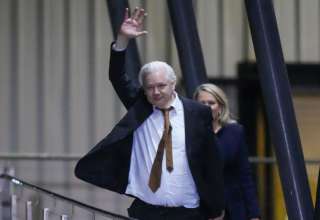
By Brian Boyd, Victorian Trades Hall Council Secretary
6 August 2013
![]() This article came from the VTHC site
This article came from the VTHC site
Millions of words, kilometres of video and countless photos appear in the mass media constantly depicting the antics of our federal politicians of all persuasions. The first half of 2013 has been particularly obsessive.
Jibes and counter-jibes, differences often separated by a millimetre, are analysed to death. Personality traits, what clothes certain parliamentarians wear, even down to tie colours, are given exaggerated coverage. Cartoons lampoon individual characteristics.
Some commentators immerse themselves in endless scenarios of who said what and dwell about what a selected quote really meant or can such and such a politician really be believed this time!
The reality is much more basic. Millions of ordinary working Australians, union members and non-union alike, go to work every day and sell their labour and abilities to earn wages and salaries to make a living.
On the other hand, big and medium size businesses and enterprises manoeuvre to maximise profits. One of the ways often deployed in this endeavour is to try to cut the wages and salaries and reduce other hard won working conditions of the employees. The organised, unionised segments of the labour force work to protect the value put on work and even grow the take home pay of their memberships.
This struggle is a constant in the nation’s economy. It’s a fundamental dichotomy – a fair entitlement of labour’s worth in contrast to the profit maximisation of capital.
The shenanigans of Canberra don’t often tackle this basic economic disparity in a proper fashion.
The mainstream media’s focus on how politicians spin their words and play act to gain attention would have everyone believe it’s all about personalities. Sometimes it may rise to the level of which representative of the mainstream political parties looks and sound more trustworthy, more believable.
But below the surface of the hullabaloo, the huffing and puffing, chest beating, magazine puff pieces and the willingness or otherwise of family members to be used for photos shoots, the fundamentals of how this great country is faring, are glimpsed from time to time.
Only a week ago the Business Council of Australia (BCA) released its pre-federal election blueprint – a 190 page Action Plan for Enduring Prosperity.
Parts of the media stopped momentarily obsessing about Abbott’s and Rudd’s endless commentary about themselves and decided to promote what big business wanted. It couldn’t be helped but the real agenda, as far as the business class was concerned, was revealed.
Simply the BCA wanted more freedom to make, more profit. 93 demands on what they wanted the next incoming federal government to do, were documented.
One newspaper described the plan as “a prudent economic narrative” and “eminently responsible” and suggested Rudd and Abbott should “step beyond the Punch and Judy politics of modern electioneering”, and take it seriously.
This gratuitous advice to the politicians, about behaving more seriously, is rich given that same newspaper and many other publications, are regularly out to do each other, selling the Punch and Judy mentality!
The same newspaper commented the BCA plan could achieve “full employment, a strong society and reasonable distribution of wealth and income” (emphasis added).
The newspaper also went on to highlight a key BCA aim – a call for a boost in productivity by having “a shake-up of the Fair Work Act”. This demand was described as “admirable pragmatism” by the BCA.
Another newspaper said the BCA’s plan “deserves serious attention” and highlighted its call to free up the labour market with the need to look at “the extent to which the high minimum wage (sic) prevents new labour market entrants from gaining initial experience”. It went on to also highlight the BCA wants ‘to improve workplace laws’ – this is code for more restrictions on workers being able to collectively organise and bargain via their unions.
The BCA is so cocky it even promoted the spreading of the GST to fresh food, health services and education, unabashed on the thousands of dollars this would add to ordinary household annual bills.
A business newspaper ran a front page headline: “Pro-union workplace laws are ’ridiculous,’. Huge mining company Rio Tinto spokesperson David Peever repeated the often stated lie, since 2009, that access to workplaces by unions needed to be “bought back into balance”.
Peever knows all too well how onerous current right of entry provisions have been for years.
Many mining companies, including Rio Tinto, have used every trick they can to prevent workers in the resources sector even having basic discussions with their unions.
A recent modest alteration to the right of entry code, access to lunch rooms, if a suitable location is not agreed, is not an unbalanced scenario, as unions well know. Yet the employers and the conservatives went berserk when this came in back in June.
What really got up their noses over the Fair Work Act Amendment Bill 2013 was the fact that the Gillard/Rudd government, after 2007 had made promises to big business and apparently “commitments” were given that the WorkChoices – like elements concerning right of entry, carried through into the Fair Work 2009, would never be altered.
The ILO ‘committee of experts’ has consistently ruled that both the WorkChoices and FW Act provisions on ‘right of entry’ have always been in breach of ILO organising rights conventions.
Off the back of the regular public debate about finding ways to improve national productivity, the Australian Mines and Metals Association also recently revealed the employer’s real agenda. They demanded Kevin Rudd take immediate action to overhaul workplace laws. The AMMA argued so called workplace reform was needed to improve flexibility and reduce costs. Again all code for being able to casualise workers and pay them less.
Back in July another newspaper highlighted another big business organisation pushing the real agenda in the national political framework. The need for more restrictive, blatantly anti-union legislation was identified by the Australian Industry Group (A.I.G.) as its – “No 1 Policy priority for the next federal government”. After surveying over 300 members the A.I.G. organisation found I.R. changes and cutting red tape (e.g. OHS requirements) was what most employers wanted.
The facts are that current I.R. laws are so restrictive workers cannot take basic action to protect or promote their day to day interests whenever they arise.
Recently maritime workers involved with the ‘Spirit of Tasmania’ ferry between Melbourne and the ‘apple isle’ couldn’t legally take any action to support sacked fellow workers. Their union was tied up in the courts. Community activists came into help but also faced court action.
The current IR laws in this and countless other basic disputes at workplaces across the country are faced with legalised minefields.
The employer associations are trying to dominate the public narrative, especially leading up to the federal election. They try to link the national interest to their interests. Pro-employer changes to the Fair Work Act is their obsession. They have achieved many legislative changes in their favour for the last 20 years and they still want more.
In enterprise bargaining discussions they don’t want to talk about job security initiatives: they want to “tightly define” issues in EBA’s; they don’t want workers to be able to take action over wider social and community issues that affect them; they don’t want unions to have a say over protecting established wages and conditions when greenfield projects and enterprises are being contemplated; that sacked workers haven’t got any rights to seek redress if unfairly treated; that if a company wishes to transfer or restructure all or parts of its business, claims to protect establishes hard won wages and entitlements of affected workers, cannot be pursued.
This wish –list alone illustrates the real agenda: turning Australian workers into virtual unrepresented slaves.
Some employers are so determined to create a labour market dominated by them that they even attack their political party of choice, the Liberal Party.
The AMMA recently was critical of Tony Abbott’s current I.R. stance, because he won’t openly support the return of individual contracts.
Steve Knot CEO of the AMMA said the ALP “has gone backwards” since 2013. He added; “Ironically, the Coalitions improved workplace relations score is largely due to the party’s pledge to uphold policy promises originally made by Kevin Rudd and Julia Gillard in 2007”!
Before the federal election announcement, for September 7, made on Sunday 4/8/13, Kevin Rudd tried to have a high level summit (24/7) of business and union representatives to discuss the “national competitiveness agenda”. The BCA wasn’t interested in giving public recognition to the ACTU, saying: “Australia has come a long way from 1980’s and there are many more stakeholders in the productivity and competiveness picture than just unions, who don’t have the influence or the coverage of the workforce that they once had”.
It is a contempt of organised labour of the highest order. The union movement is still the biggest industrial, social and democratic structure in the country, regardless of the drop in overall coverage in recent decades and far more representative than the various big business associations.
These big business associations are like ‘broken records’ in their persistent rants to curtail workers’ rights at work.
The have achieved too much in this area and want more.
Recently for example it was reported that weekend work has trebled over the past 20 years, from 12 percent of workers in 1993 to 33 percent today, Australian Bureau of Statistics data has recently shown. Work is killing off the hard won Australian weekend and depriving family time. Australians are now three times more likely to work weekends than they were 20 years ago – that is one in three workers spends Saturday or Sunday on the job. Australians spend more time in the workplace, rather than in the backyard or on the beach with family and friends. And one in four workers is on call or on standby. Leisure time is often disturbed with messages and emails from the boss!
Hours of work, insecure work, casualised work are only part of the overall ongoing attack on workers’ rights.
How far will the employers push to further fragment and atomise the workforce? How far will they push the next federal government to have IR legislation to further curtail the collective bargaining rights of workers?
There are big challenges ahead for the organised union movement.
It must be united and have an independent agenda as its starting point.
Unions should not compromise their abilities to put workers first.




